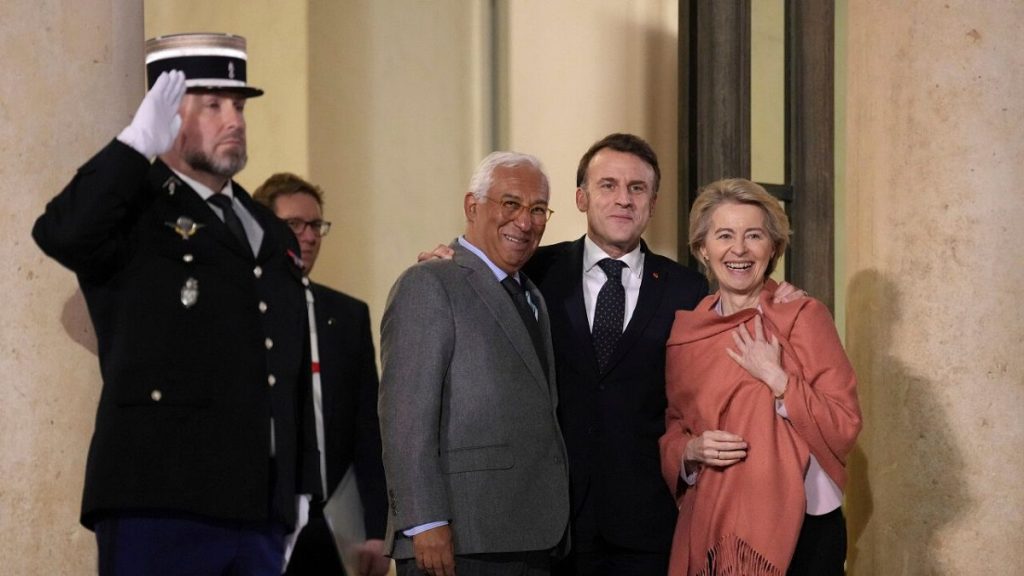Summarize this content to 2000 words in 6 paragraphs in Arabic
While the UK’s Keir Starmer reaffirmed he’s ready to consider sending British forces on the Ukrainian ground alongside others, Germany’s Olaf Scholz called the idea ‘premature.’
ADVERTISEMENTAfter three hours of emergency talks at the Elysee Palace in Paris, Europe’s leaders were left without a common view on possible peacekeeping troops after a US diplomatic blitz on Ukraine last week threw a once-solid trans-Atlantic alliance into turmoil.Hosted by French President Emmanuel Macron, the leaders of Germany, the United Kingdom, Italy, Poland, Spain, the Netherlands, Denmark attended the meeting. They were also joined by NATO chief Mark Rutte, European Commission President Ursula von der Leyen and EU Council President António Costa.There was a rift with some EU nations, like Poland, which have said they don’t want their military imprint on Ukraine soil. Macron was non-committal.UK Prime Minister Keir Starmer called for US backing while reaffirming he’s ready to consider sending British forces on the Ukrainian ground alongside others “if there is a lasting peace agreement.”He emphasised that a trans-Atlantic bond remained essential. “There must be a US backstop, because a U.S. security guarantee is the only way to effectively deter Russia from attacking Ukraine again,” he said.Dutch Prime Minister Dick Schoof acknowledged the Europeans “need to come to a common conclusion about what we can contribute. And that way we will eventually get a seat at the table,” adding that “just sitting at the table without contributing is pointless.”He added that “if the security guarantees mean that European troops are needed, then I think that the Netherlands should at least enter into discussions.”Boots on the ground ‘premature’Highlighting the inconsistencies among many nations about potential troop contributions, German Chancellor Olaf Scholz said talk of boots on the ground was “premature.”“This is highly inappropriate, to put it bluntly, and honestly: we don’t even know what the outcome will be” of any peace negotiation, he added.European nations are bent though on boosting their armed forces where they can after years of US complaints, and most have increased defence spending to 2% of gross domestic product, but the path to reaching 3% is unclear.”The time has come for a much greater ability of Europe to defend itself,” Poland’s Prime Minister Donald Tusk said. “There is unanimity here on the issue of increasing spending on defence. This is an absolute necessity.” Poland spends more than 4% of its GDP on defence, more than any other NATO member.Last week, US Vice President JD Vance and Defence Secretary Pete Hegseth questioned both Europe’s security commitments and its fundamental democratic principles.Macron, who has long championed a stronger European defence, said their stinging rebukes and threats of non-cooperation in the face of military danger felt like a shock to the system.The tipping point came when Trump decided to upend years of US policy by holding talks with Russian President Vladimir Putin in hopes of ending the Russia-Ukraine war.Shortly before the meeting in Paris Monday, Macron spoke with Trump, but Macron’s office would not disclose details about the 20-minute discussion.
rewrite this title in Arabic What are the prospects of European peacekeeping troops in Ukraine? Leaders remain divided
مقالات ذات صلة
مال واعمال
مواضيع رائجة
النشرة البريدية
اشترك للحصول على اخر الأخبار لحظة بلحظة الى بريدك الإلكتروني.
© 2025 جلوب تايم لاين. جميع الحقوق محفوظة.


